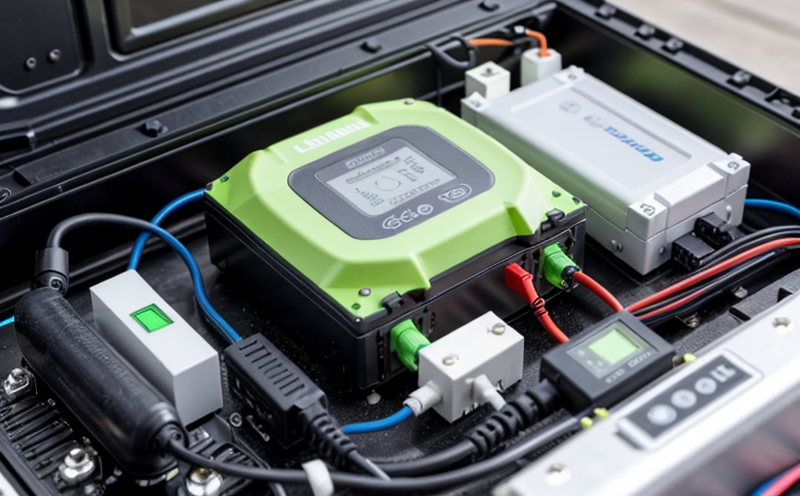NF EN 62133 Lithium-Ion Battery Testing for Secondary Portable Applications
The NF EN 62133 standard is pivotal in ensuring the safety and reliability of lithium-ion batteries used in secondary portable applications such as cellular phones, laptops, and medical devices. This standard sets out comprehensive testing procedures that manufacturers must adhere to before bringing their products to market. Compliance with these stringent tests ensures not only consumer safety but also the longevity and performance of the battery.
The standard covers a wide range of tests including electrical safety, mechanical stability, thermal management, and durability under various conditions. Electrical safety tests ensure that the battery operates within safe voltage limits and does not overheat or short circuit during normal use. Mechanical stability tests evaluate how well the battery withstands physical shocks, vibrations, and other stresses encountered in everyday usage.
Thermal management is a critical aspect of lithium-ion batteries due to their tendency to generate heat during operation. The standard mandates rigorous thermal stress testing that simulates real-world conditions where batteries are subjected to high temperatures, low temperatures, and temperature cycling. This helps identify potential risks associated with overheating or cold exposure.
Durability tests assess the battery’s ability to maintain its performance over time through repeated charging cycles, discharge cycles, and storage periods. These tests ensure that secondary portable devices remain functional for extended periods without degradation in their performance metrics such as capacity retention and internal resistance increase.
Compliance with NF EN 62133 is mandatory for manufacturers aiming to sell lithium-ion batteries or products containing them within the European Economic Area (EEA). By adhering to this standard, companies demonstrate their commitment to quality assurance and safety standards set by regulatory bodies like the European Commission. This not only protects end-users from potential hazards but also enhances brand reputation and market trust.
The standard is regularly updated based on feedback from industry experts and advancements in technology. It reflects best practices adopted globally for improving battery safety without compromising on functionality or user experience. Manufacturers who fail to comply face penalties including fines and restrictions on product distribution, which can significantly impact business operations.
In conclusion, NF EN 62133 plays a crucial role in safeguarding public health and promoting responsible manufacturing practices within the electronics industry. Its stringent requirements contribute towards creating safer environments both at home and abroad while fostering innovation through continuous improvement efforts among stakeholders involved in designing and producing lithium-ion batteries.
Why It Matters
The importance of NF EN 62133 cannot be overstated, especially given the increasing demand for portable electronic devices that rely on lithium-ion batteries. These batteries power everything from smartphones to electric vehicles (EVs), making their safety paramount. Non-compliance with this standard can lead to severe consequences including fires, explosions, and even fatalities.
Consumer trust is another critical factor influenced by adherence to NF EN 62133. Customers expect reliable products that perform consistently over long periods without posing risks. Companies that meet these stringent requirements build loyalty among consumers who appreciate safe technology solutions.
From an environmental perspective, ensuring battery safety through rigorous testing helps minimize waste generation and promotes sustainable practices throughout the product lifecycle. Proper disposal methods can prevent hazardous materials from entering landfills or water bodies, thereby reducing pollution levels.
The standard also supports research and development efforts aimed at improving battery technology. By setting benchmarks for performance, it encourages continuous innovation leading to more efficient, longer-lasting batteries that meet evolving consumer expectations.
Ultimately, NF EN 62133 serves as a cornerstone in maintaining high standards across the industry while fostering collaboration between various stakeholders including manufacturers, regulators, and end-users.
Why Choose This Test
- Comprehensive Coverage: The NF EN 62133 standard encompasses a broad spectrum of tests addressing different aspects of lithium-ion battery safety. From electrical insulation to mechanical integrity, no detail is overlooked.
- Regulatory Compliance: By undertaking these tests, manufacturers ensure their products comply with EU regulations and directives, facilitating smoother market entry processes.
- Enhanced Reputation: Meeting the stringent requirements of NF EN 62133 enhances a company's reputation among consumers and industry peers alike. It demonstrates a commitment to quality and safety.
- Potential Cost Savings: Early identification of potential issues through thorough testing can prevent costly recalls later on, protecting brand integrity and customer satisfaction.
- Sustainability Focus: The standard promotes sustainable practices by encouraging responsible use and disposal of batteries, contributing to environmental conservation efforts.
The NF EN 62133 Lithium-Ion Battery Testing for Secondary Portable Applications is essential for any organization involved in the design, manufacturing, or distribution of portable electronic devices. It provides peace of mind knowing that your products meet international standards ensuring safety, reliability, and sustainability.
Environmental and Sustainability Contributions
- Battery Recycling: By promoting safer handling practices during the lifecycle of lithium-ion batteries, NF EN 62133 encourages recycling initiatives which help recover valuable resources like cobalt, nickel, and manganese.
- Reduction in Harmful Emissions: Safer batteries contribute to better overall performance of electric vehicles (EVs) reducing harmful emissions from transportation sectors.
- Resource Efficiency: Testing ensures optimal usage rates minimizing waste generation during manufacturing processes contributing towards a circular economy model.
- Eco-Friendly Packaging: Compliance with this standard supports eco-friendly packaging design practices promoting reduced environmental footprints associated with product distribution and transport activities.
Incorporating NF EN 62133 into your quality assurance protocols offers numerous benefits beyond mere compliance. It fosters a culture of continuous improvement supporting long-term sustainability goals aligned with global initiatives aimed at protecting our planet for future generations.





